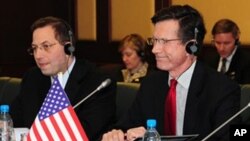The United States and Uzbekistan are working to increase bilateral trade and investment. On a recent trip to the region, U.S. Assistant Secretary of State for South and Central Asia Affairs Robert Blake said Uzbekistan has great potential for further economic development, including greater U.S. investment.
Many U.S. companies already have long and prosperous commercial relationships with Uzbekistan. Case New Holland has been manufacturing agricultural equipment in Tashkent for 15 years. NUKEM has been operating in the country for 20 years. Boeing has been supplying aircraft and technical training to Uzbekistan Airways since 1995, and delivery of its 787 Dreamliner in 2016 will make possible direct flights between Uzbekistan and the United States.
Economic development of the entire Central Asia region is an important U.S. priority. Uzbekistan, as the center of Central Asia, has a vital role to play in that development and would benefit greatly from increased regional trade and investment. Uzbekistan already is a key part of economic development in Afghanistan, providing electricity to Kabul and supporting much-needed infrastructure projects like the rail line from Hairaton to Mazar-e-Sharif.
The United States supports Uzbekistan’s efforts to promote reforms that will increase economic growth. At the same time, the U.S. is doing what it can to improve the investment climate. Under the framework of the bilateral Science and Technology Agreement, for example, cooperation in research has helped Uzbekistan increase the value of its agricultural exports.
But obstacles to doing business in Uzbekistan remain. One of those is delays in currency conversion that prevent manufacturers from importing the supplies they need to produce their finished goods, and the problem can be compounded by complex and uncertain customs procedures. Businesses face these issues while contending with an opaque regulatory environment.
Increased dialogue between the state, private businesses, and foreign investors would be a first step towards identifying challenges and developing and enacting reforms that allow entrepreneurs to succeed while still meeting the needs of the government.
Another key factor for spurring economic growth and improving the investment climate is promoting respect and realization of internationally-recognized workers’ rights. Such rights lead to positive, long-term economic outcomes, including higher levels of foreign direct investment.
Uzbekistan also needs to continue reforms to strengthen the rule of law, including intellectual property rights protection, and reduce corruption so that all businesses can operate under one transparent set of rules.
“I am confident,” said Assistant Secretary Blake, “that progress on these issues will lead to tangible results through greater U.S. investment and increased bilateral trade.”
Many U.S. companies already have long and prosperous commercial relationships with Uzbekistan. Case New Holland has been manufacturing agricultural equipment in Tashkent for 15 years. NUKEM has been operating in the country for 20 years. Boeing has been supplying aircraft and technical training to Uzbekistan Airways since 1995, and delivery of its 787 Dreamliner in 2016 will make possible direct flights between Uzbekistan and the United States.
Economic development of the entire Central Asia region is an important U.S. priority. Uzbekistan, as the center of Central Asia, has a vital role to play in that development and would benefit greatly from increased regional trade and investment. Uzbekistan already is a key part of economic development in Afghanistan, providing electricity to Kabul and supporting much-needed infrastructure projects like the rail line from Hairaton to Mazar-e-Sharif.
The United States supports Uzbekistan’s efforts to promote reforms that will increase economic growth. At the same time, the U.S. is doing what it can to improve the investment climate. Under the framework of the bilateral Science and Technology Agreement, for example, cooperation in research has helped Uzbekistan increase the value of its agricultural exports.
But obstacles to doing business in Uzbekistan remain. One of those is delays in currency conversion that prevent manufacturers from importing the supplies they need to produce their finished goods, and the problem can be compounded by complex and uncertain customs procedures. Businesses face these issues while contending with an opaque regulatory environment.
Increased dialogue between the state, private businesses, and foreign investors would be a first step towards identifying challenges and developing and enacting reforms that allow entrepreneurs to succeed while still meeting the needs of the government.
Another key factor for spurring economic growth and improving the investment climate is promoting respect and realization of internationally-recognized workers’ rights. Such rights lead to positive, long-term economic outcomes, including higher levels of foreign direct investment.
Uzbekistan also needs to continue reforms to strengthen the rule of law, including intellectual property rights protection, and reduce corruption so that all businesses can operate under one transparent set of rules.
“I am confident,” said Assistant Secretary Blake, “that progress on these issues will lead to tangible results through greater U.S. investment and increased bilateral trade.”




